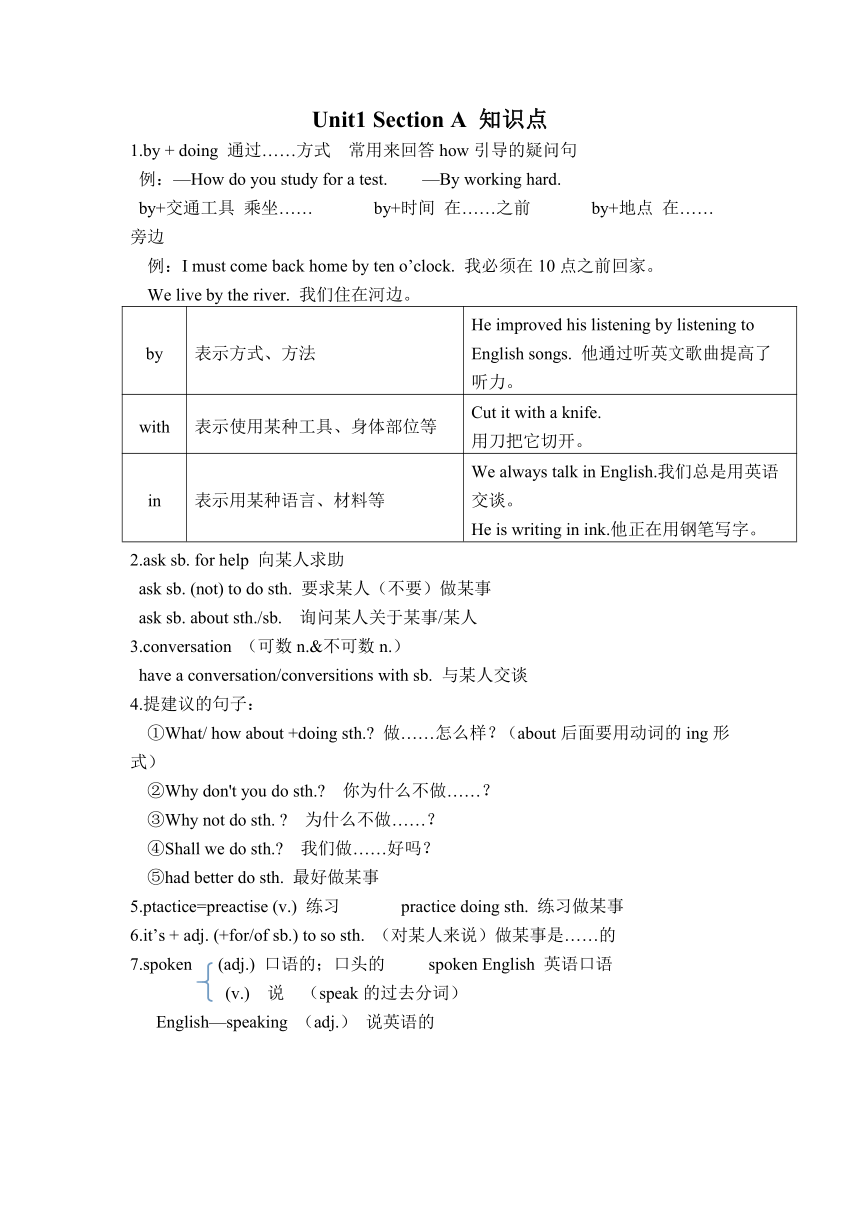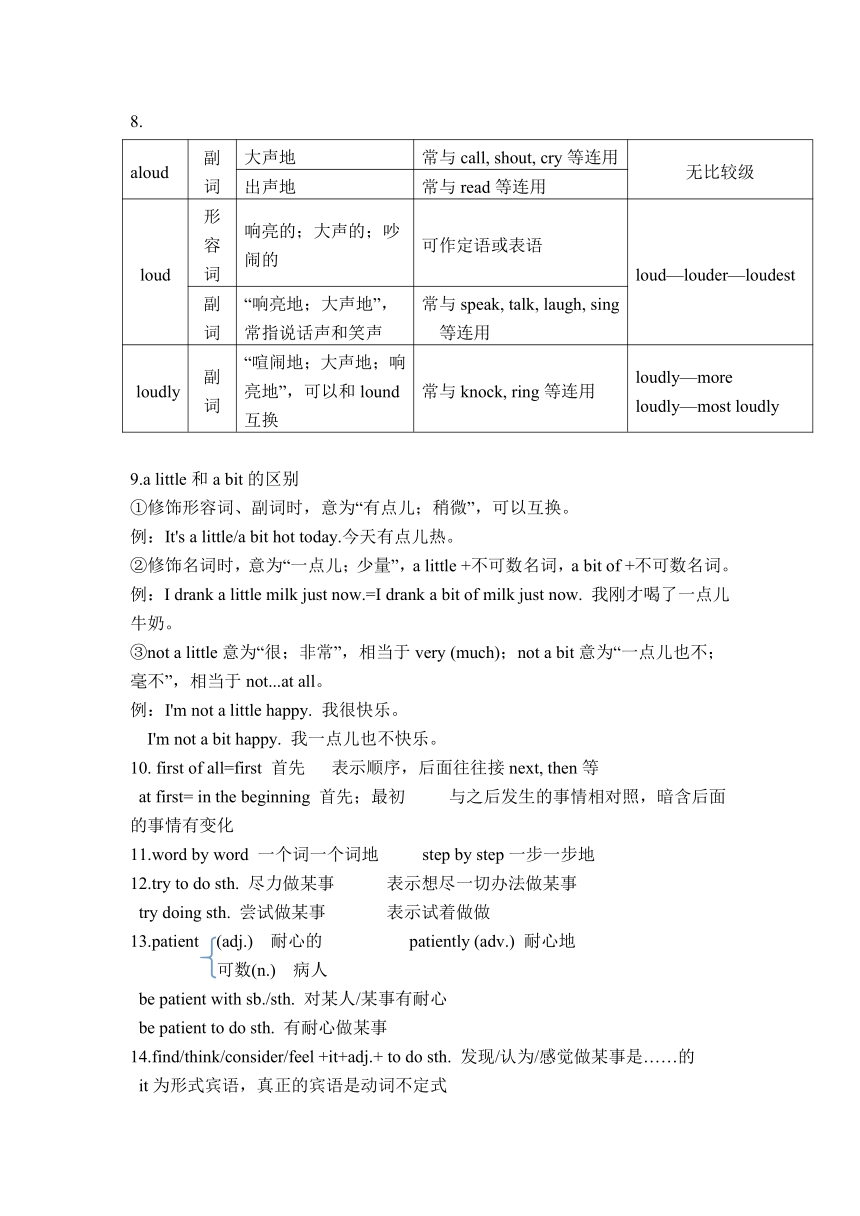人教版九年级全册Unit1 How can we become good learners?知识点清单
文档属性
| 名称 | 人教版九年级全册Unit1 How can we become good learners?知识点清单 |  | |
| 格式 | docx | ||
| 文件大小 | 27.7KB | ||
| 资源类型 | 教案 | ||
| 版本资源 | 人教新目标(Go for it)版 | ||
| 科目 | 英语 | ||
| 更新时间 | 2024-10-10 14:42:57 | ||
图片预览


文档简介
Unit1 Section A 知识点
1.by + doing 通过……方式 常用来回答how引导的疑问句
例:—How do you study for a test. —By working hard.
by+交通工具 乘坐…… by+时间 在……之前 by+地点 在……旁边
例:I must come back home by ten o’clock. 我必须在10点之前回家。
We live by the river. 我们住在河边。
by 表示方式、方法 He improved his listening by listening to English songs. 他通过听英文歌曲提高了听力。
with 表示使用某种工具、身体部位等 Cut it with a knife. 用刀把它切开。
in 表示用某种语言、材料等 We always talk in English.我们总是用英语交谈。 He is writing in ink.他正在用钢笔写字。
2.ask sb. for help 向某人求助
ask sb. (not) to do sth. 要求某人(不要)做某事
ask sb. about sth./sb. 询问某人关于某事/某人
3.conversation (可数n.&不可数n.)
have a conversation/conversitions with sb. 与某人交谈
4.提建议的句子:
①What/ how about +doing sth. 做……怎么样?(about后面要用动词的ing形式)
②Why don't you do sth. 你为什么不做……?
③Why not do sth. 为什么不做……?
④Shall we do sth. 我们做……好吗?
⑤had better do sth. 最好做某事
5.ptactice=preactise (v.) 练习 practice doing sth. 练习做某事
6.it’s + adj. (+for/of sb.) to so sth. (对某人来说)做某事是……的
7.spoken (adj.) 口语的;口头的 spoken English 英语口语
(v.) 说 (speak的过去分词)
English—speaking (adj.) 说英语的
8.
aloud 副词 大声地 常与call, shout, cry等连用 无比较级
出声地 常与read等连用
loud 形容词 响亮的;大声的;吵闹的 可作定语或表语 loud—louder—loudest
副词 “响亮地;大声地”,常指说话声和笑声 常与speak, talk, laugh, sing等连用
loudly 副词 “喧闹地;大声地;响亮地”,可以和lound互换 常与knock, ring等连用 loudly—more loudly—most loudly
9.a little和a bit的区别
①修饰形容词、副词时,意为“有点儿;稍微”,可以互换。
例:It's a little/a bit hot today.今天有点儿热。
②修饰名词时,意为“一点儿;少量”,a little +不可数名词,a bit of +不可数名词。
例:I drank a little milk just now.=I drank a bit of milk just now. 我刚才喝了一点儿牛奶。
③not a little意为“很;非常”,相当于very (much);not a bit意为“一点儿也不;毫不”,相当于not...at all。
例:I'm not a little happy. 我很快乐。
I'm not a bit happy. 我一点儿也不快乐。
10. first of all=first 首先 表示顺序,后面往往接next, then等
at first= in the beginning 首先;最初 与之后发生的事情相对照,暗含后面的事情有变化
11.word by word 一个词一个词地 step by step一步一步地
12.try to do sth. 尽力做某事 表示想尽一切办法做某事
try doing sth. 尝试做某事 表示试着做做
13.patient (adj.) 耐心的 patiently (adv.) 耐心地
可数(n.) 病人
be patient with sb./sth. 对某人/某事有耐心
be patient to do sth. 有耐心做某事
14.find/think/consider/feel +it+adj.+ to do sth. 发现/认为/感觉做某事是……的
it为形式宾语,真正的宾语是动词不定式
15.secret 可数(n.) 秘密;秘诀 the secret to ……的秘诀
(adj.) 秘密的;保密的
16.so that =in order that以便于;为了 引导目的状语从句
因此,所以 引导结果状语从句
so+adj./adv. +that 如此……以至于
17.be afraid to do sth. 不敢做某事
be afraid of (doing) sth. 害怕(做)某事
be afraid that 恐怕
18.fall in love with = be in love with 爱上……
19. be / get excited about sth. 对…感兴奋
20.
other “别的,其他的”,可以修饰单数或复数名词
the other 表示两者中的“另一个”,是特指,常用于one..the other..结构中,表示“一个……另一个……”。the other之后也可接数词或复数名词,特指“其他的”,这时other是形容词
others 用作代词,泛指“其他的人或物”,常用于some... others结构中,表示“一些…,其他的……”
the others 特指在一个范围内的“其他的人或物”
another 泛指三者或三者以上中的另一个,其后可接单数名词
21.help sb. (to) so sth. = help sb. with sth. 帮助某人做某事
22.
as well 用于肯定句 “也;还”,用于句末,前面无逗号
too “也”,用于句末,前面有逗号
also “也”,位于助动词、情态动词或连系动词be之后,实义动词之前
either 用于否定句 “也(不)”,用于句末,前面有逗号
23.note (可数n.) 笔记;记录
(v.) 注意;指出;记录;记下 note down记下;记录
24.memorize= remember (v.) 记忆;记住 memory (n.) 回忆;记忆力
Unit1 Section B 知识点
1.not always/both/all/everyone/everything 表示部分否定
例:Not everyone likes this book. 并非人人都喜欢这本书。
2.what/how/when/where/which/who + to + know/tell/wonder/ask/show/teach/learn/decide等动词连用,可在句中作主语、表语、宾语。“疑问代词+动词不定式”结构做主语时,谓语动词要用单数形式。
例:How to improve my spoken English is a big problem.
3.increase (n.&v.) 增加;增长
increase to 增加到 increase by增加了
例:The price of the vegetables increased by 10%. 蔬菜的价格上涨了10%。
4.at high/low speed 以高/低速
at a speed of 以……的速度
5.make a mistake/mistakes in 在某方面犯错误
例:I used to make a mistakes in spelling. 我过去常犯拼写错误。
6.get +宾语+宾语补足语(形容词、现在分词、过去分词、动词不定式) 使某人或某物处于某种状态
get... right 使……正确,纠正……
7.born (v.) 出世 bear—bore—born/borne
(adj.) 天生的 通常置于名词前作定语
be born with意为“天生具有”常指生来就具有某种天分、性格或患有某种疾病等。
例:She was born with a gift for music. 她天生具有音乐天赋。
8.the ability to do sth. 做某事的能力
have ability in doing sth. 有能力做某事
9.But whether or not you can do this well depends on your learning habits.
主语从句:whether or not you can do this well是一个从句,作整个句子的主语,单个主语从句作主语时,谓语动词用单数形式。
depend on+ n./代/v-ing 视……而定;依靠;依赖
10.have... in common (with sb./sth.) 与(某人/某物)有共同点;有相同之处
11.be interested in = take an interest in 对……感兴趣
12.
create 创造;创建 产生的新东西往往是精神上的 (如艺术、文学作品中的人物)
discover 发现 发现本来已经存在的事物
invent 发明 发明的对象是以前没有的东西
13.pay attention to + n./代/v-ing 注意;关注
14.connect...with.. 把……和……连接或联系起来
be connected with... 与……有关系;与……有亲戚关系
15.get bored 感到厌倦/无聊 get用作连系动词时,其后常接形容词作表语。
16.think about 认为;思考
think over 仔细考虑 think of 想起;认为
17.even if = even though 即使;虽然 有退一步设想的意思,用来引导让步状语从句
18.unless = if... not 除非;如果不 引导条件状语从句
当主句是一般将来时或祈使句或主句谓语含有情态动词时,unless从句用一般现在时
19.keep (sb.) doing sth. (让某人)一直做某事
20.
look for 寻找 强调寻找的动作和过程,是有目的地找
find 找到;发现 通常指找到或发现具体的东西,也可指偶然发现某物或某种情况,强调的是结果
find out 查明;弄清 多指通过调查、询问、研究等之后“搞清楚、弄明白”,通常含有“经过艰难曲折”之意
on one's own 独自;独立地
remember to do sth. 记得要做某事(事情还未做)
remember doing sth. 记得做过某事(事情已经做了)
1.by + doing 通过……方式 常用来回答how引导的疑问句
例:—How do you study for a test. —By working hard.
by+交通工具 乘坐…… by+时间 在……之前 by+地点 在……旁边
例:I must come back home by ten o’clock. 我必须在10点之前回家。
We live by the river. 我们住在河边。
by 表示方式、方法 He improved his listening by listening to English songs. 他通过听英文歌曲提高了听力。
with 表示使用某种工具、身体部位等 Cut it with a knife. 用刀把它切开。
in 表示用某种语言、材料等 We always talk in English.我们总是用英语交谈。 He is writing in ink.他正在用钢笔写字。
2.ask sb. for help 向某人求助
ask sb. (not) to do sth. 要求某人(不要)做某事
ask sb. about sth./sb. 询问某人关于某事/某人
3.conversation (可数n.&不可数n.)
have a conversation/conversitions with sb. 与某人交谈
4.提建议的句子:
①What/ how about +doing sth. 做……怎么样?(about后面要用动词的ing形式)
②Why don't you do sth. 你为什么不做……?
③Why not do sth. 为什么不做……?
④Shall we do sth. 我们做……好吗?
⑤had better do sth. 最好做某事
5.ptactice=preactise (v.) 练习 practice doing sth. 练习做某事
6.it’s + adj. (+for/of sb.) to so sth. (对某人来说)做某事是……的
7.spoken (adj.) 口语的;口头的 spoken English 英语口语
(v.) 说 (speak的过去分词)
English—speaking (adj.) 说英语的
8.
aloud 副词 大声地 常与call, shout, cry等连用 无比较级
出声地 常与read等连用
loud 形容词 响亮的;大声的;吵闹的 可作定语或表语 loud—louder—loudest
副词 “响亮地;大声地”,常指说话声和笑声 常与speak, talk, laugh, sing等连用
loudly 副词 “喧闹地;大声地;响亮地”,可以和lound互换 常与knock, ring等连用 loudly—more loudly—most loudly
9.a little和a bit的区别
①修饰形容词、副词时,意为“有点儿;稍微”,可以互换。
例:It's a little/a bit hot today.今天有点儿热。
②修饰名词时,意为“一点儿;少量”,a little +不可数名词,a bit of +不可数名词。
例:I drank a little milk just now.=I drank a bit of milk just now. 我刚才喝了一点儿牛奶。
③not a little意为“很;非常”,相当于very (much);not a bit意为“一点儿也不;毫不”,相当于not...at all。
例:I'm not a little happy. 我很快乐。
I'm not a bit happy. 我一点儿也不快乐。
10. first of all=first 首先 表示顺序,后面往往接next, then等
at first= in the beginning 首先;最初 与之后发生的事情相对照,暗含后面的事情有变化
11.word by word 一个词一个词地 step by step一步一步地
12.try to do sth. 尽力做某事 表示想尽一切办法做某事
try doing sth. 尝试做某事 表示试着做做
13.patient (adj.) 耐心的 patiently (adv.) 耐心地
可数(n.) 病人
be patient with sb./sth. 对某人/某事有耐心
be patient to do sth. 有耐心做某事
14.find/think/consider/feel +it+adj.+ to do sth. 发现/认为/感觉做某事是……的
it为形式宾语,真正的宾语是动词不定式
15.secret 可数(n.) 秘密;秘诀 the secret to ……的秘诀
(adj.) 秘密的;保密的
16.so that =in order that以便于;为了 引导目的状语从句
因此,所以 引导结果状语从句
so+adj./adv. +that 如此……以至于
17.be afraid to do sth. 不敢做某事
be afraid of (doing) sth. 害怕(做)某事
be afraid that 恐怕
18.fall in love with = be in love with 爱上……
19. be / get excited about sth. 对…感兴奋
20.
other “别的,其他的”,可以修饰单数或复数名词
the other 表示两者中的“另一个”,是特指,常用于one..the other..结构中,表示“一个……另一个……”。the other之后也可接数词或复数名词,特指“其他的”,这时other是形容词
others 用作代词,泛指“其他的人或物”,常用于some... others结构中,表示“一些…,其他的……”
the others 特指在一个范围内的“其他的人或物”
another 泛指三者或三者以上中的另一个,其后可接单数名词
21.help sb. (to) so sth. = help sb. with sth. 帮助某人做某事
22.
as well 用于肯定句 “也;还”,用于句末,前面无逗号
too “也”,用于句末,前面有逗号
also “也”,位于助动词、情态动词或连系动词be之后,实义动词之前
either 用于否定句 “也(不)”,用于句末,前面有逗号
23.note (可数n.) 笔记;记录
(v.) 注意;指出;记录;记下 note down记下;记录
24.memorize= remember (v.) 记忆;记住 memory (n.) 回忆;记忆力
Unit1 Section B 知识点
1.not always/both/all/everyone/everything 表示部分否定
例:Not everyone likes this book. 并非人人都喜欢这本书。
2.what/how/when/where/which/who + to + know/tell/wonder/ask/show/teach/learn/decide等动词连用,可在句中作主语、表语、宾语。“疑问代词+动词不定式”结构做主语时,谓语动词要用单数形式。
例:How to improve my spoken English is a big problem.
3.increase (n.&v.) 增加;增长
increase to 增加到 increase by增加了
例:The price of the vegetables increased by 10%. 蔬菜的价格上涨了10%。
4.at high/low speed 以高/低速
at a speed of 以……的速度
5.make a mistake/mistakes in 在某方面犯错误
例:I used to make a mistakes in spelling. 我过去常犯拼写错误。
6.get +宾语+宾语补足语(形容词、现在分词、过去分词、动词不定式) 使某人或某物处于某种状态
get... right 使……正确,纠正……
7.born (v.) 出世 bear—bore—born/borne
(adj.) 天生的 通常置于名词前作定语
be born with意为“天生具有”常指生来就具有某种天分、性格或患有某种疾病等。
例:She was born with a gift for music. 她天生具有音乐天赋。
8.the ability to do sth. 做某事的能力
have ability in doing sth. 有能力做某事
9.But whether or not you can do this well depends on your learning habits.
主语从句:whether or not you can do this well是一个从句,作整个句子的主语,单个主语从句作主语时,谓语动词用单数形式。
depend on+ n./代/v-ing 视……而定;依靠;依赖
10.have... in common (with sb./sth.) 与(某人/某物)有共同点;有相同之处
11.be interested in = take an interest in 对……感兴趣
12.
create 创造;创建 产生的新东西往往是精神上的 (如艺术、文学作品中的人物)
discover 发现 发现本来已经存在的事物
invent 发明 发明的对象是以前没有的东西
13.pay attention to + n./代/v-ing 注意;关注
14.connect...with.. 把……和……连接或联系起来
be connected with... 与……有关系;与……有亲戚关系
15.get bored 感到厌倦/无聊 get用作连系动词时,其后常接形容词作表语。
16.think about 认为;思考
think over 仔细考虑 think of 想起;认为
17.even if = even though 即使;虽然 有退一步设想的意思,用来引导让步状语从句
18.unless = if... not 除非;如果不 引导条件状语从句
当主句是一般将来时或祈使句或主句谓语含有情态动词时,unless从句用一般现在时
19.keep (sb.) doing sth. (让某人)一直做某事
20.
look for 寻找 强调寻找的动作和过程,是有目的地找
find 找到;发现 通常指找到或发现具体的东西,也可指偶然发现某物或某种情况,强调的是结果
find out 查明;弄清 多指通过调查、询问、研究等之后“搞清楚、弄明白”,通常含有“经过艰难曲折”之意
on one's own 独自;独立地
remember to do sth. 记得要做某事(事情还未做)
remember doing sth. 记得做过某事(事情已经做了)
同课章节目录
- Unit 1 How can we become good learners.
- Section A
- Section B
- Unit 2 I think that mooncakes are delicious!
- Section A
- Section B
- Unit 3 Could you please tell me where the restroom
- Section A
- Section B
- Unit 4 I used to be afraid of the dark.
- Section A
- Section B
- Unit 5 What are the shirts made of?
- Section A
- Section B
- Review of Units 1-5
- Unit 6 When was it invented?
- Section A
- Section B
- Unit 7 Teenagers should be allowed to choose their
- Section A
- Section B
- Unit 8 It must belong to Carla.
- Section A
- Section B
- Unit 9 I like music that I can dance to.
- Section A
- Section B
- Unit 10 You're supposed to shake hands.
- Section A
- Section B
- Review of Units 6-10
- Unit 11 Sad movies make me cry.
- Section A
- Section B
- Unit 12 Life is full of the unexpected
- Section A
- Section B
- Unit 13 We're trying to save the earth!
- Section A
- Section B
- Unit 14 I remember meeting all of you in Grade 7.
- Section A
- Section B
- Review of Units 11-14
